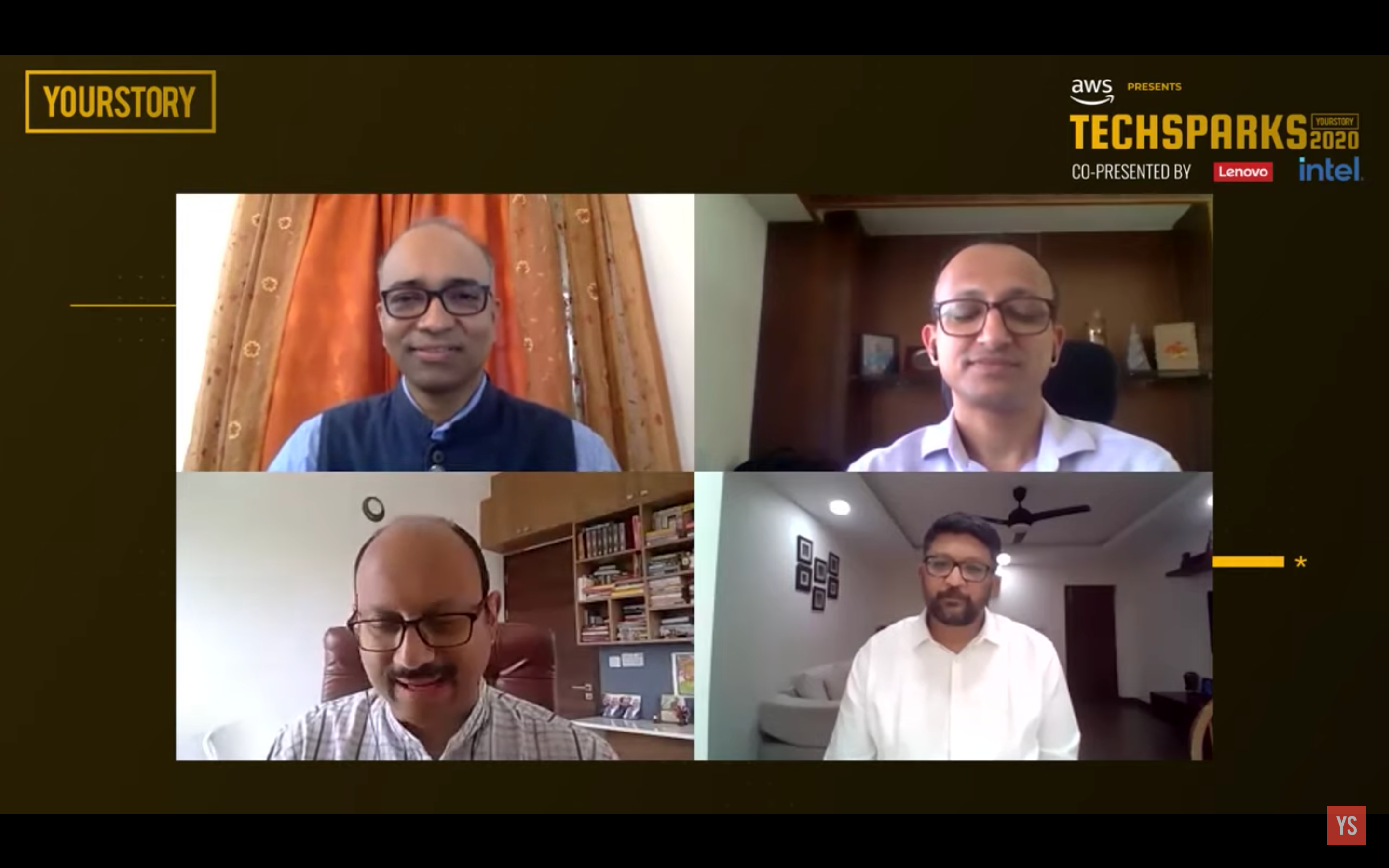When you are in urban India and suppose you have an urgent need for printed copies of documents - you are guaranteed to find a copy machine shop anywhere nearby where you can get your physical copy at a small price. A similar situation may take much more time and cost more for a native of any rural area in Karnataka.
Narrating this scenario, Madan Padaki, Founder and CEO of 1Bridge, shared a very important thought saying, “How much of access choice and convenience choice are we taking for granted sitting in our homes in urban India?”
At YourStory’s flagship event TechSparks 2020, Madan Padaki delves into ‘bringing new commerce into our villages and ushering in abundance’ with a panel of experts that included Rampraveen Swaminathan, Managing Director and Chief Executive Officer at Mahindra Logistics Ltd; Anilkumar SG, Founder and CEO at Samunnati; and Gaurav Gupta, COO at Ananya Finance.
“In villages, the cost of transactions are very high. So, each of us (the panellists) in our own way have been trying to bring down these costs and improve accessibility. With this conversation, we hope to arrive at a road map to indulge in a collaborative effort to build resilience in villages,” Madan says, kickstarting the discussion.
Building an ‘Aatmanirbhar Gaav’
In these difficult times, it is of utmost importance to make our rural sectors self-sufficient and make the basics accessible to them – medicines, food, groceries, healthcare facilities, etc. Anilkumar talks about some of the key aspects that his organisation followed to help the rural collectives that they work with.
“At Samunnati, we’re following an AMLA approach (Aggregation, Market Linkage, Advisory) services while working with farmer collectives. The idea is to engage with an entity covering both dimensions of responding to the market, with an affinity of an institution,” he says.
Extending that conversation, Gaurav Gupta adds by highlighting the reality of becoming truly Aatmanirbhar by tapping into the heart of the rural economy.
“For aatmanirbharta to come, arthavyavastha (economy) has to be there. Moreover, agriculture is the centre of the rural economy. You cannot transform a rural area unless you target this agricultural economy. So, we’ve been trying to finance FPOs in order to boost this,” says Gaurav.

Moreover, the usage of technology for an integrative platform, which has all features from credit, finances to insurance options can go a long way in building this resilience.
“It is only possible when people come together, when there are common infrastructures and facilities that seamlessly integrate the flow and the cost is shared across multiple entities,” Madan says.
“The new rural model bringing together talent, entrepreneurial spirit, aspirations of people and technology together can recreate a new rural ecosystem,” he adds.
Pandemic lessons
“My learning from this entire pandemic is that we need to build resilience as an organisation, and sometimes, the best way to do this is by not planning too much. The second thing is to communicate; we have been communicating with rural areas because a large part of our workforce consists of migrant labourers,” says Rampraveen.
He also says that there was a bit of a challenge during the reverse migration and the asymmetry of information across India. A good population of these rural areas lacked crucial information about the pandemic.
Adding to this, Gaurav highlights how despite working towards financial inclusion, most of it does not reflect in rural India. Gaurav and his team are working to see what can be changed from a business perspective.
“We certainly have to have a more focussed strategy for rural India. Despite being in the financial inclusion sectors for over 30 years, most of our money has gone predominantly to the urban areas, and not really to the villages, but is definitely something we want to do,” Gaurav.
Talking more about managing the problem at hand, Anilkumar talked about how they went about resolving issues efficiently at their organisation once the pandemic struck.
“We allocated two distinct teams to engage with FPOs and to take care of the agri-enterprises. With FPOs, we decided to aggregate the problem in-hand, the problem that is likely to come up and the time frame for this. On the other hand, the other team tried to understand what the requirements were and what timeframe they could provide. This way, we tried to match the supply and demand,” he says.
Need for collaborative efforts
To truly witness self-sufficiency in villages, there needs to be a collaborative effort from various sectors. If we have to reach out to villages, we need to be able to provide them with some crucial facilities to make lives easier.
“In the last 10 years, we have hardly had any collaborations, but the last four months have seen a lot more of them. Technology is giving us the opportunity to collaborate and connect with other organisations. So unless we collaborate, we will not be able to make them truly ‘Aatmanirbhar’,” says Gaurav.
Adding to that point, Rampraveen further stresses on the value of partnerships in building a self-sustained ecosystem “Most new-age startups in the last decade have realised that they cannot really build an ecosystem and both manage risks and capabilities without partnerships. I think there is enough data which evidences the need to do it.”
While this is common in urban India, the challenge with rural India is that the aspects become a lot harder – finding the right partner, the right ecosystem, be able to measure risks to develop capability. More than a philosophical misalignment, getting it done is the real problem, he says.
Closing on a positive note, Madan says, “The only way to empower our villages is by working together. We can figure out a way, both for short and long terms, to truly power the growth of our country.”
TechSparks - YourStory's annual flagship event - has been India's largest and most important technology, innovation, and entrepreneurship summit for over a decade, bringing together entrepreneurs, policymakers, technologists, investors, mentors, and business leaders for stories, conversations, collaborations, and connections that matter. As TechSparks 2020 goes all virtual and global in its 11th edition, we want to thank you for the tremendous support we've received from all of you throughout our journey and give a huge shoutout to our sponsors of TechSparks 2020.
Edited by Anju Narayanan
Link : https://yourstory.com/2020/11/techsparks-2020-building-aatmanirbhar-villages-collaborative-effort
Author :- Anju Ann Mathew ( )
November 15, 2020 at 06:35AM
YourStory




